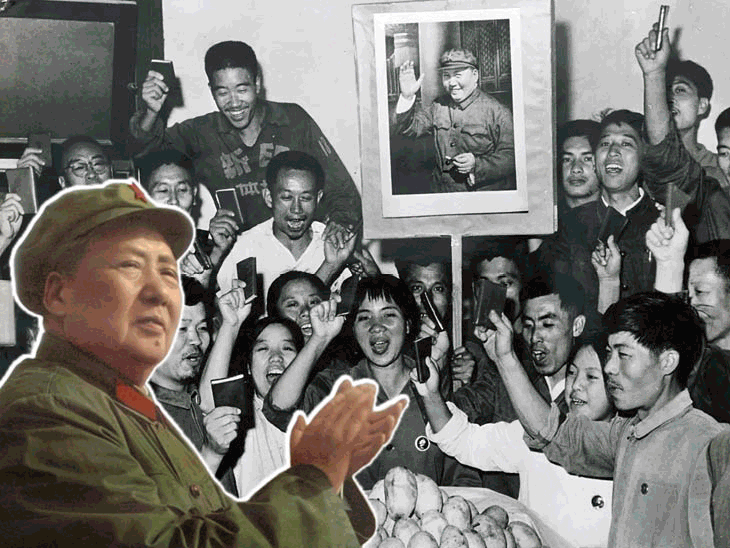Beijing8 minutes ago
- Copy link

Professor Muhammad Yunus, the head of the interim government of Bangladesh, has sent 1,000 kg mango India. This initiative of Bangladesh is being called ‘Mango Diplomacy’.
Mango diplomacy means to use fruits like mangoes as ‘gift’ to strengthen political or diplomatic relationships. Pakistan is credited with the introduction of Mango Diplomacy.
In the story we will learn about the start of mango diplomacy. We will learn further why Mao Jedang had distributed common mangoes among the laborers. Why these mangoes were worshiped like gods and how the person who did not like the common man was hanged…

China’s Supreme Leader Mao Jedang had presented mangoes to the workers of factories.
Year- 1968
Place- Beijing
The then Foreign Minister of Pakistan Mian Arshad Hussain was on a visit to China. There he met the Supreme Leader Mao Jedang and presented 40 mango cotton. This was happening for the first time when a leader took mangoes on a foreign trip. The common became a symbol of friendship between the two countries.
Well, Mao did not like mangoes, so they ordered them to divide them among the workers. These laborers were followers of Mao. These were engaged in stopping the students who were protesting against the Chinese government in universities.
These laborers had never seen mangoes, seeing the mango kept in the golden glass box, they became so emotional that they accepted it as the blessings of Mao. Historian Alfreda Merc has written a book ‘Maoz Golden Mangoz and the Cultural Revolution’ by Supreme Leader Mao and Mango.

Painting of Chinese laborers and mangoes.
Mango became a symbol of love and faith Merc has explained in detail in the book how these Pakistani mangoes became a symbol of love and faith for Mao in China.
It is written in the preamble of the book-

People in China did not know the common man in the sixties. When these common university reached the campus, the workers kept staring, smelling, caressing the mango throughout the night. He felt that Mao honored him with some divine object.

The Chinese officials were surprised when the workers saw this behavior. The publicity department of the Communist Party of China saw the way of promotion of Mao in this. Then these mangoes were sent to the factories of the entire capital.

In Chinghua, welcoming laborers-farmer publicity teams welcoming mangoes. It is written on the ribbon- Happy immortal life to Chairman Mao.
In factories, people were taught how to catch mangoes, how to worship it. If someone took it lightly, he would get reprimanded. A mango was taken from the factory to the airport with band instruments and processions. Public tableau of mangoes was taken out in some places.
Merc also gives an example of a textile factory, where a large ceremony took place in the reception of mangoes. Mango was safe in wax and placed in a hall. The laborers came in queue and came to see him and as soon as mangoes appeared, they bowed their heads in reverence.
When mangoes reached a factory in Beijing, there was a debate among the people whether it should be eaten or kept handled? After all, it was decided that it will be saved by placing it in formaldehyde, and his wax will be copied and given to every laborer. These wax mangoes were locked in glass and kept with reverence.
When mangoes started rotting at one place, the workers boiled their pulp in water and drank that ‘holy water’ with a spoon. It is said that when Mao was told, he laughed.

This 1968 poster is written-our great leader Mao always connects his hearts with the hearts of people.
Mango gets God -like status
This was the period when the cultural revolution started in Mao Jedang’s leadership in China. Temples were being demolished across the country. The idols were being destroyed. But at the same time, altars were being decorated for mangoes. People would offer flowers to mangoes, bow their heads in reverence and sing hymns.
In some factories, mangoes were boiled and ‘holy broth’ was made, which was drunk like a special tonic. Soon the rumor spread that these mangoes are like an immortal fruit.
Mao himself did not eat mangoes. It was propagated in such a way that Mao himself did not eat mangoes and divided them among the laborers. In this way he sacrificed the long life of his life. People felt that Mao gave up his happiness so that the general public could get this fruit.
In this way, a mango manufactured a place in Chinese history that probably never got any other fruit in the world. The common man had become a tool to prove the power of Mao and the loyalty of the laborers.
This mania of mango was adopted even more deeply by the Communist Party of the Communist Party of China. Soon, various types of household items were made about the shape and fragrance of mangoes. Such as sheets, washbasins, vanity stands, common-minded soaps and even mango-tasted cigarettes.

In the National Day Parade of October 1968, huge paper-mashi mangoes were kept in the tableau of Beijing. Pictures of mangoes started to be worshiped across the country. Even in the distant Guijhou, thousands of farmers fought for just one mango photocopy.
The team of campaigners of the Communist Party went out to roam around China with real and fake copies of mangoes on trucks. Wherever he went, he was welcomed with drums and reverence. People used to come to see how mangoes actually look.
Death sentence for mango evil
However, not everyone was trusting in the story of this purity. When it reached the common Sichuan by truck, a local dentist named Dr. Han said to the sweet potato.
Although he said this jokingly, it was then seen as a ‘blasphemy’. Dr. Han was arrested for insulting Mao. He was rolled across the city behind a truck and finally hanged.
However, gradually this craze began to fade. About 18 months later, the mangoes of wax, which were previously worshiped, are now used like candles.

In October 1968, during the tableau of Beijing’s National Day Parade in Harbin city, it was taken into fake mango compartments of wax.
Mao wrapped in wax like mangoes Then the year 1976 came. Mao Jedang had fallen ill. It was decided that Mao’s death was near, in such a situation, the war of succession was intensified. Mao’s wife Jiang King thought of using mangoes to replace her husband.
Jiang King tried to make that mango a weapon of publicity. He again sent ceremonies, gave speeches to the common laborers, and also made a film called ‘Song of the Mango’. But these efforts proved to be meaningless. Jiang King was arrested after Mao’s death.
His fate of Mao Jedong’s death also happened like a mango. His body is protected from the process of wax in a glass case, and he is still kept for public performance in the ‘Museum of Mao Jedang’ at Tianmen Chowk, Beijing.
,
Read this news related to mangoes too …
Bangladesh sent 1000 kg mangoes to PM Modi: Yunus retained mango diplomacy, Mamta also gifted Haribhanga mangoes

Muhammad Yunus, the head of the interim government of Bangladesh, has sent 1,000 kg of mangoes of ‘Haribhanga’. As part of an attempt to improve relations with India, this initiative of Bangladesh is being called ‘Mango Diplomacy’. Read full news here …



